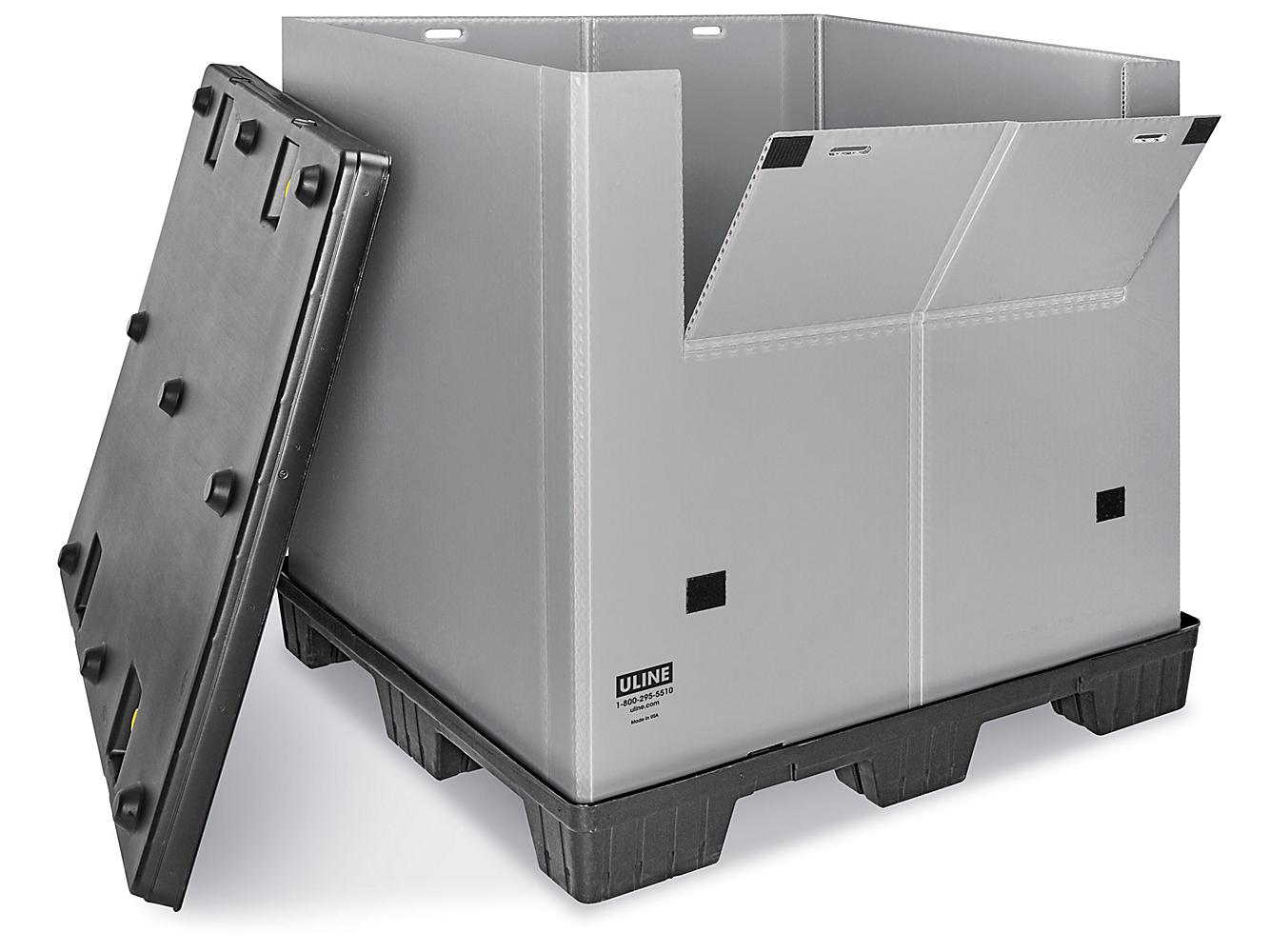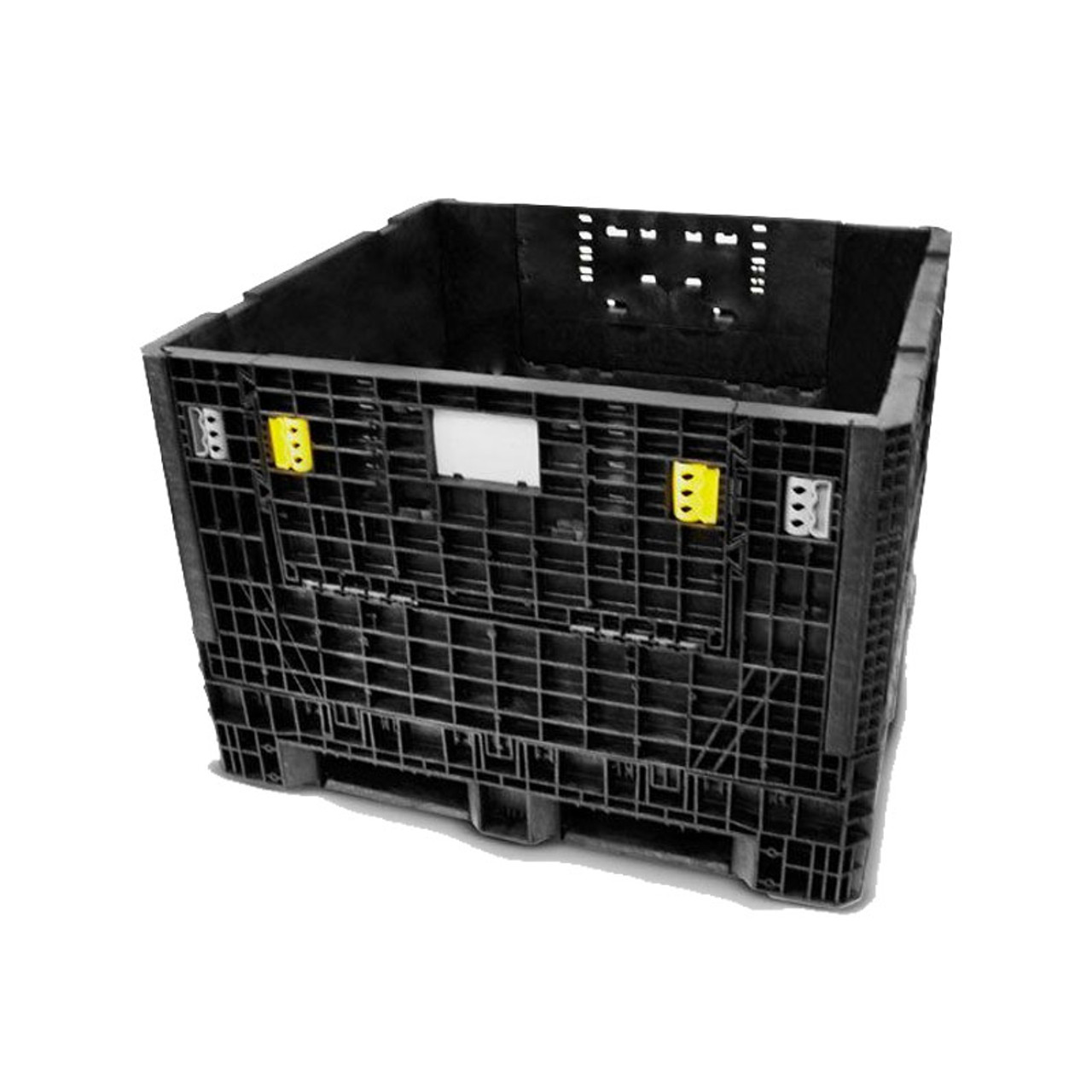The Role of Mass Plastic Containers in Effective Recycling Practices and Sustainability
Bulk plastic containers are integral to modern reusing efforts. Their design improves the efficiency of material collection and transportation, adding to sustainability objectives. These containers not just maximize room however additionally help in monitoring contamination levels. Their application is not without difficulties. Understanding the full scope of their influence discloses an intricate relationship in between logistics and environmental responsibility that necessitates additional exploration.
Understanding Mass Plastic Containers
Bulk plastic containers work as a crucial part in different industries, facilitating the storage space and transport of items. These containers are typically made from robust products such as high-density polyethylene (HDPE) or polypropylene, which offer longevity and resistance to ecological aspects. Their style usually consists of features like stackability and modularity, enabling effective use of space throughout both storage space and transportation.
Industries such as farming, food handling, and manufacturing regularly use bulk plastic containers as a result of their light-weight nature and ease of handling. The containers can be found in different sizes and arrangements, satisfying the specific demands of various products. Their flexibility prolongs past simple capability; they can also be tailored with covers, handles, and classifying options to enhance use - plastic bulk containers. As a result, bulk plastic containers play a critical duty in optimizing logistics and supply chain operations throughout numerous industries, consequently adding to total effectiveness and cost-effectiveness
Benefits of Making Use Of Mass Plastic Containers in Recycling
The utilization of mass plastic containers substantially enhances the efficiency of the procedure when organizations focus on reusing initiatives. These containers are made to maximize room, permitting for the storage and transportation of larger amounts of recyclable materials. This results in less trips to reusing facilities, therefore minimizing gas usage and connected emissions.
Additionally, mass plastic containers are immune and durable to various ecological factors, ensuring that materials continue to be secured during handling and transit. Their lightweight style further contributes to lower transportation expenses.
Moreover, the harmony of these containers facilitates much better sorting and handling of recyclable products, which can enhance overall recycling prices - bulk plastic containers for sale. Organizations that adopt bulk plastic containers likewise demonstrate a dedication to sustainability, positively affecting their brand image. Ultimately, these benefits not only streamline recycling practices but additionally add to broader environmental objectives
Just How Bulk Plastic Containers Facilitate Material Collection
Reliable material collection is significantly enhanced by the use of mass plastic containers, as they offer a effective and organized option for gathering recyclable things. These containers are developed to accommodate huge quantities of products, which streamlines the sorting and storage space procedure. Their stackable layout makes best use of space usage, making it easier for facilities to arrange recyclables without clutter.
In addition, bulk plastic containers are weather-resistant and long lasting, permitting exterior positioning without deterioration. This strength assures that products continue to be secured until they are gathered for handling.

The uniformity in dimension and shape of these containers promotes standardization across collection factors, enabling much better monitoring of recyclable quantities. Their transparent nature enables for easy visibility of components, assisting in the monitoring of contamination degrees and assuring that just appropriate materials are accumulated. In general, mass plastic containers play an essential duty in enhancing the product collection procedure, thus advertising efficient reusing methods.
Transport Performance and Environmental Influence
Transportation performance plays an important role in the recycling process, particularly with the optimization of load ability wholesale plastic containers. By maximizing the volume of material delivered, companies can substantially lower the variety of journeys required, thus decreasing their carbon footprint. This technique not just boosts operational efficiency however likewise adds to much more lasting ecological techniques.

Optimizing Load Capacity
Enhancing lots capability is frequently ignored, it plays a necessary duty in boosting transportation effectiveness and lessening ecological effect in reusing methods. By taking full advantage of the volume that mass plastic containers can hold, recycling procedures can minimize the number of journeys required for transportation. This not only lowers fuel usage but additionally decreases the damage on automobiles. Efficient lots monitoring permits centers to make use of area efficiently, ensuring that each transport cycle is as productive as possible. In addition, well-optimized lots can result in far better arrangements with logistics providers, potentially lowering total expenses. Eventually, boosting load ability contributes to a much more lasting reusing system by cultivating efficient source use and reducing waste created during transport.
Reducing Carbon Impact
As recycling procedures undertaking to decrease their environmental effect, minimizing the carbon impact related to transport becomes an essential objective. Mass plastic containers play a vital duty in achieving this aim by improving load performance and optimizing logistics. Their light-weight yet long lasting design enables maximum freight room utilization, lowering the variety of trips called Homepage for to move materials. By consolidating shipments, recycling centers can reduce gas usage and greenhouse gas exhausts. In enhancement, purposefully situating recycling facilities lessens transportation distances, in addition lowering carbon results. Furthermore, using fuel-efficient automobiles and different energy sources improves total sustainability. By integrating these methods, the recycling industry can significantly decrease its carbon impact, contributing to a more lasting future.
Obstacles in making use of Mass Plastic Containers

Contamination Issues
Contamination problems stand for a considerable challenge in the reliable use mass plastic containers within reusing techniques. These containers usually gather residues from previous contents, leading to blended materials that can hinder the reusing procedure. Impurities such as food waste, chemicals, or non-recyclable materials can endanger the honesty of the entire batch, causing enhanced disposal expenses and decreased reusing rates. Additionally, inappropriate cleaning or sorting can exacerbate these issues, making it difficult for recycling centers to process products effectively. The existence of pollutants not just influences the high quality of recycled items however additionally undermines the total sustainability initiatives intended at reducing plastic waste. Dealing with these contamination challenges is important for boosting the efficiency of bulk plastic container recycling.
Recycling Facilities Limitations
Inefficiency in reusing facilities presents substantial obstacles for the effective management of mass plastic containers. Lots of recycling facilities do not have the capability to refine big quantities of these containers efficiently, resulting in increased prices and hold-ups. In addition, insufficient sorting innovations frequently cause contamination, as bulk containers might be blended with other products, complicating the recycling process. Minimal transport choices also prevent the motion of mass plastic containers to appropriate reusing centers, resulting in enhanced land fill waste. Additionally, an absence of standard procedures for mass container recycling produces confusion among customers and services, additionally complicating initiatives to promote sustainability. Attending to these infrastructure constraints is necessary to improve recycling methods and optimize the potential of mass plastic containers in a round economy.
Best Practices for Executing Bulk Plastic Containers
When organizations think about executing mass plastic containers in their recycling practices, they need to focus on a strategic strategy that boosts performance and decreases contamination risks. Picking the suitable container size and type is necessary to suit the volume of materials being processed. Organizations must likewise develop clear labeling and signs to direct individuals on appropriate disposal approaches, minimizing confusion and errors. Regular training sessions for staff can additionally reinforce these methods, guaranteeing everyone comprehends their duties in keeping recycling integrity.
In addition, companies ought to apply a routine upkeep timetable to inspect and clean containers, preventing the build-up of impurities. Partnering with neighborhood reusing centers can likewise streamline the collection procedure, making sure that products are properly processed. Ultimately, companies should keep an eye on and assess their reusing metrics, utilizing this data to fine-tune methods gradually and advertise constant renovation in their sustainability initiatives.
The Future of Mass Plastic Containers in Sustainable Practices
As organizations significantly prioritize sustainability, the function of bulk plastic containers in reusing methods is established to develop considerably. Innovations in products science are bring about the development of eco-friendly and recyclable alternatives, enhancing the environmental benefits of mass plastic containers. Additionally, the implementation of closed-loop systems will enable less complicated collection and repurposing of these containers, reducing waste and resource usage.
Technological developments, such as smart monitoring systems, will make it possible for firms to check the lifecycle of bulk containers, improving effectiveness in recycling processes. As consumer need for sustainable practices grows, organizations will likely adopt bulk plastic containers developed for reuse and long-term worth. Cooperation between markets and governments will certainly cultivate the facility of standardized recycling protocols, making certain that mass bulk plastic containers for sale containers are efficiently incorporated right into wider sustainability efforts. In general, the future of mass plastic containers shows up promising, with substantial capacity for adding to a circular economic climate.
Frequently Asked Questions
Exactly How Are Bulk Plastic Containers Made and What Materials Are Used?
Mass plastic containers are usually made from high-density polyethylene (HDPE) or polypropylene (PP) These products are refined through injection molding or blow molding techniques, causing resilient, light-weight containers suitable for different storage space and transportation needs.
Can Bulk Plastic Containers Be Reused Multiple Times Prior To Recycling?
Yes, bulk plastic containers can be reused several times prior to recycling. Their longevity and style permit duplicated usage in various applications, promoting sustainability and resource effectiveness while minimizing the need for new containers.

What Accreditations Exist for Mass Plastic Containers in Recycling?
Various qualifications for mass plastic containers include the Recycling Collaboration's accreditation, the Cradle to Cradle Licensed ™ requirement, and the Sustainable Packaging Coalition's guidelines, ensuring containers meet specific ecological and recyclability standards for efficient recycling.
Exactly How Do Bulk Plastic Containers Contrast to Various Other Recycling Storage Options?
Bulk plastic containers supply higher durability and capability contrasted to other reusing storage choices, lowering the risk of contamination and promoting efficient transportation. Their layout sustains better company, improving general performance in recycling procedures.
What Is the Life-span of a Mass Plastic Container in Recycling Processes?
The life expectancy of a mass plastic container in recycling procedures normally varies from 5 to 10 his explanation years, depending upon usage, material quality, and ecological conditions, permitting multiple cycles of usage prior to ultimate disposal or recycling.
When companies focus on recycling initiatives, the application of bulk plastic containers substantially enhances the efficiency of the process. Transportation effectiveness plays a crucial role in the reusing process, particularly with the optimization of lots ability in bulk plastic containers. The use of mass plastic containers in reusing methods encounters considerable difficulties, specifically worrying contamination concerns and limitations within recycling framework. Contamination concerns represent a substantial challenge in the reliable usage of bulk plastic containers within recycling techniques. When organizations take into consideration executing mass plastic containers in their reusing practices, they need to focus on a critical method that enhances performance and reduces contamination risks.